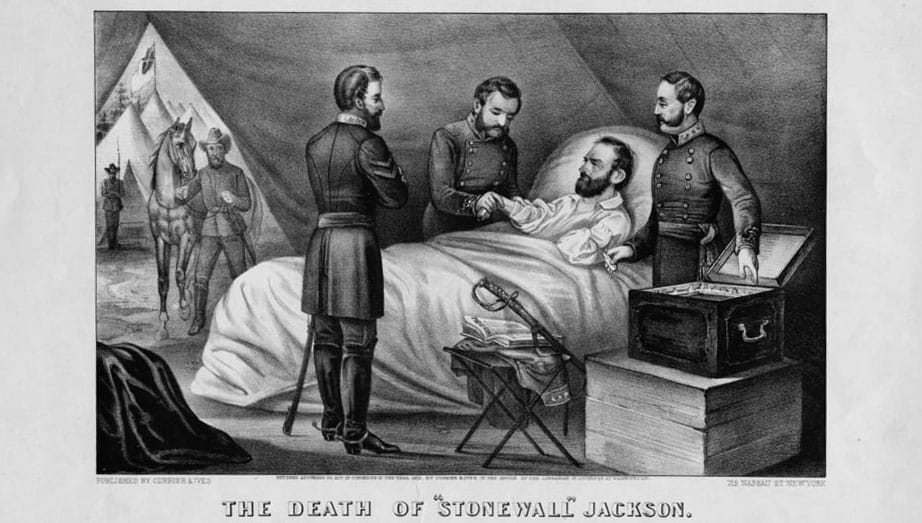May 3, 1863 – May 16, 1863
By Phil Kohn
Phil Kohn can be reached at USCW160@yahoo.com.
May 3, 1863, sees the Confederates south and west of Chancellorsville, Virginia, continuing to pound Maj. Gen. Joseph Hooker’s Federals, who pull back to the fords at the Rappahannock River. At Fredericksburg, Virginia, Maj. Gen. John Sedgwick’s 30,000 Union troops attack. Maj. Gen. Jubal Early’s 10,000 Confederates hold their positions initially, but then are pushed west of town. At Cedar Bluff, Alabama, after days of skirmishes, Col. Abel Streight surrenders 1,466 Union cavalrymen to Brig. Gen. Nathan Bedford Forrest 24 miles short of their Rome, Georgia, target. By marching his 400 troopers in a circle, Forrest has fooled Streight into thinking he has a much bigger force. Streight spends the next ten months at Libby Prison, in Richmond, Virginia, as a prisoner of war before escaping and making his way back to Union lines.
On May 4, Gen. Lee splits his army yet a third time (he had left Early and his force back in Fredericksburg, then sent Jackson’s Corps on an “end run” to attack the Federal right flank at Chancellorsville), sending some troops from around Chancellorsville eastward. They and Early’s men stop Sedgwick at Salem Church, west of Fredericksburg. The Confederates continue to push the Federals and the Yankees finally fall back across the Rappahannock River. In Mississippi, Maj. Gen. Ulysses Grant moves troops into the area south of Vicksburg, with fighting occurring at the Big Black River. Farther south, in Louisiana, Union troops of Maj. Gen. Nathaniel Banks attack Fort DeRussy, on the Red River, but are rebuffed.
Maj. Gen. Hooker, on May 5, orders the Army of the Potomac to disengage from the fighting around Chancellorsville and withdraw across the Rappahannock River. While a Confederate victory, the Battle of Chancellorsville is costly for both sides. Casualties total 17,300 for the Union, 13,300 for the Confederates. Maj. Gen. Nathaniel Banks’s Union troops in Louisiana have better luck: Reinforced, they again attack Fort DeRussy, but they find the site abandoned. In Dayton, Ohio, former U.S. Representative Clement L. Vallandigham — a leading Peace Democrat (a faction known as “Copperheads”) and outspoken Lincoln critic who has termed the war as “wicked and cruel” — is arrested while campaigning for governor of Ohio and charged with disloyalty by Maj. Gen. Ambrose Burnside. Tried by a military commission and found guilty of “expressing treasonable sympathies,” he is sentenced to prison.
At Guiney’s Station, Virginia, on May 6, while awaiting removal to Richmond for treatment of his wounds, including the amputation of one arm, Lt. Gen. Thomas “Stonewall” Jackson contracts pneumonia. Union troops occupy Alexandria, Louisiana, where Maj. Gen. Banks’s men begin destroying stores of cotton and other supplies. In Virginia, President Lincoln and Maj. Gen Halleck meet with Maj. Gen Hooker to discuss the dire military situation and strategy going forward. Afterward, Maj. Gen. Hooker publicly congratulates the Army of the Potomac: “The men are to be commended on the achievements of the past seven days.”
On May 7, in Spring Hill, Tennessee, Confederate Maj. Gen. Earl Van Dorn, commander of one of Gen. Braxton Bragg’s cavalry divisions, is assassinated by Dr. George Peters, a physician, who claims that Van Dorn “violated the sanctity of his home.” Widespread rumors have it that Van Dorn, ever the ladies’ man, had visited young Mrs. Peters at home several times while the doctor was away (Jesse Peters was 25 years younger than her husband and had expressed being “bored” by her husband’s frequent trips away from home). It was also alleged that Van Dorn and Mrs. Peters took unchaperoned carriage rides together.
In Washington, D.C., President Lincoln issues a proclamation on May 8 that being an alien would not exempt anyone from military service if the person had declared intent to become a U.S. citizen.
Confederate cavalry burns a Federal oil works at Oiltown, in western (West) Virginia, on May 9. In New York, an editorial in the New York World newspaper, in response to Maj. Gen, Hooker’s May 6 congratulations to the Army of the Potomac, states: “Whoever knows the facts of the last two weeks will shudder as he reads this order [Hooker’s congratulatory announcement]. Whoever does not, let him credit it and believe that his ignorance is bliss.”
Lt. Gen. Thomas J. “Stonewall” Jackson succumbs to pneumonia at Guiney’s Station, Virginia, at the age of 39 on May 10, 1863. Revered by his men and heavily relied upon by Gen. Lee, Jackson’s death is a major blow to the South, both militarily and psychologically. In Tennessee, Brig. Gen. Nathan Bedford Forrest takes over for the late Earl Van Dorn as commander of the cavalry division of Gen. Braxton Bragg’s left wing.
Continued agitation and strained feelings over opposing political opinions within President Lincoln’s Cabinet once again prompt Secretary of the Treasury Salmon Chase to tender his resignation on May 11. Once again, President Lincoln refuses to accept Chase’s offer of departure.
After resupplying his forces, Maj. Gen. Ulysses Grant pushes on towards Vicksburg. A Union division under Maj. Gen. John Logan, positioned at Raymond, Mississippi, about 15 miles from Vicksburg, is attacked on May 12 and fighting is heavy. Each side reports casualties upward of 500, and the Confederates finally withdraw eastward toward Jackson.
Federal troops on May 14 capture and sack Jackson, the capital of Mississippi, as the Confederates pull back farther north. The retreat is deemed necessary by commander Gen. Joseph Johnston, knowing that his force is well outnumbered. To the south, Maj. Gen. Nathaniel Banks leads his Union troops out of Alexandria, Louisiana, and heads for Port Hudson, north of Baton Rouge. After Vicksburg, Port Hudson is considered the second most important Confederate defense point along the Mississippi River. In Washington, D.C., there is growing concern over the Army of the Potomac, which has done little since its defeat at Chancellorsville. President Lincoln writes to Maj. Gen. Hooker, saying: “Some of your troops and Division Commanders are not giving you their entire confidence.”
Maj. Gen. Grant’s Union force on May 15 begins leaving Jackson, Mississippi, heading westward toward Vicksburg. In Richmond, President Davis meets with Secretary of War James Seddon and Gen. Robert E. Lee to discuss Vicksburg. Lee proposes invading Pennsylvania as a way of relieving the pressure on Mississippi (and on Virginia, as well). His idea is approved.
On May 16, Confederate Lt. Gen. John Pemberton, with 20,000 men east of Vicksburg, tries to link with 12,000 troops under Gen. Joseph Johnston who are north of him, in order to fight Grant together. However, 29,000 Federal soldiers block his way at Champion Hill. Despite fighting fiercely, Pemberton’s men cannot break through, suffering 3,851 casualties versus 2,481 for the Union. In Washington, D.C., Democrats protest the conviction and incarceration of Clement Vallandigham.








